English CBSE Class 11 NCERT Hornbill Chapter 2 We’re Not Afraid to Die Free Solution of Extra Questions and Answers – Extract Based Questions Short Answer Questions Long Answer Questions and Value Based Questions
WE’RE NOT AFRAID TO DIE
(Extra Questions)
Extract Based Questions
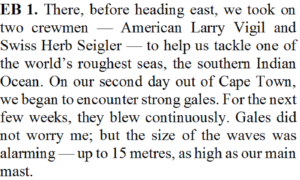

(i) To whom does the word ‘we’ refer to in above extract?
(a) author and two sailors
(b) two crewmen and builders of ship
(c) author, his wife and their two kids
(d) none of the above
(ii) The two crewmen belonged to
(a) England and Switzerland
(b) India and USA
(c) USA and Switzerland
(d) Africa and England
(iii) Which of the words used in the extract mean ‘to face’?
(a) tackle
(b) encounter
(c) both the above
(d) none of the above
(iv) The author was worried about
(a) strong gales
(b) fast gales
(c) moving waves
(d) size of waves
(v) What was the height of the mast of the ship?
(a) 10 meters
(b) 15 meters
(c) 20 meters
(d) very high
(vi) Which port did the ship leave just before the incident narrated in the extract?
(a) Indian Ocean
(b) Cape Town
(c) Plymouth
(d) None of the above
(vii) Why two extra crewmen were taken?
(a) they wanted a lift
(b) to tackle the southern Indian Ocean
(c) to give author company
(d) to repair the ship
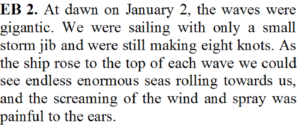

(i) ‘the waves were gigantic’. Which figure of speech has been used in this line.
(a) oxymoron
(b) simile
(c) hyperbole
(d) irony
(ii) Why were they sailing with a small storm jib?
(a) the ship was small
(b) winds were strong
(c) waves were small
(d) no other jib was available
(iii) What is the unit of speed during a voyage?
(a) kmph
(b) mph
(c) fps
(d) knots
(iv) What is meant by ‘screaming of winds’?
(a) speed of wind
(b) colour of wind
(c) direction of wind
(d) huge sound made by wind
(v) According to the extract, the speed of eight knots was considered
(a) slow
(b) high
(c) usual
(d) crawl
(vi) What is meant by ‘rolling towards us’?
(a) speeding towards our ship
(b) rotating towards our ship
(c) going away from our ship
(d) creeping towards our ship
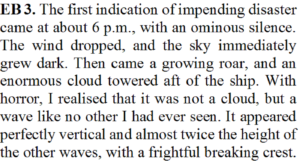

(i) Which word in the extract mean ‘forthcoming’?
(a) growing
(b) roaring
(c) impending
(d) ominous
(ii) What is ‘the wind dropped’?
(a) wind fell down
(b) wind slipped out the hands of author
(c) speed of wind greatly reduced
(d) wind started coming from below the ship
(iii) Why the sky had become dark?
(a) a cloud was approaching ship
(b) night was approaching
(c) a wave was approaching ship
(d) lights of the ship were switched off
(iv) Why was author horrified?
(a) such big wave he had never seen
(b) the wave was perfectly vertical
(c) the wave was almost twice the size of normal waves
(d) all the above
(v) Which words as used in passage are similar to ‘fear’?
(a) frightful
(b) horror
(c) growing
(d) both (a) and (b)
(vi) Which of the following was not a sign of impending disaster?
(a) ominous silence
(b) wind dropped
(c) a growing roar
(d) clock struck 6 PM
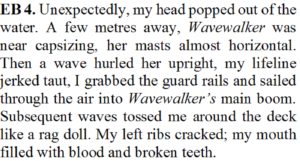

(i) Whose name was wavewalker?
(a) a crew member
(b) the ship
(c) the author
(d) the enormous wave
(ii) Which of the following activities had not happened to wavewalker
1. near capsizing
2. masts almost horizontal
3. jumped in the air
4. became upright
5. sank in the sea
(a) 2 and 5
(b) 1 and 3
(c) 3 and 5
(d) 1 and 4
(iii) Which of the injury had not happened to the author
(a) left ribs cracked
(b) mouth filled with blood
(c) both ribs cracked
(d) teeth broken
(iv) How many people had been thrown into water?
(a) one
(b) two
(c) three
(d) none
(v) In the above extract to whom does the word ‘her’ refer to?
(a) ship
(b) author
(c) author’s wife
(d) author’s daughter
(vi) Which of the following are name of parts of a ship and used in the extract
1. aft
2. mast
3. deck
4. rear
5. top
(a) 3,4 and 5
(b) 1,2 and 3
(c) 2,3 and 5
(d) 1,3 and 5
(vi) Which figure of speech has been used in ‘Subsequent waves tossed me around the deck like a rag doll’?
(a) simile
(b) irony
(c) metaphor
(d) anaphora
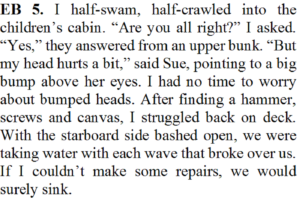

(i) Who is Sue?
(a) daughter of crewman
(b) daughter of author
(c) wife of author
(d) sister of crewman
(ii) Which side of the ship is known as starboard side?
(a) right side
(b) front side
(c) back side
(d) left side
(iii) Where were children when the author went to seen them?
(a) lower bunk
(b) upper bunk
(c) middle bunk
(d) on the floor
(iv) Which of the following things author did not collect from children’s cabin
(a) screws
(b) pliers
(c) hammer
(d) canvas
(v) What was the ship in the danger of sinking?
(a) starboard side bashed open
(b) water entering into the ship
(c) lot of water had already entered the ship
(d) all the above
(vi) Which word in the extract is synonym of ‘swollen’?
(a) answered
(b) bumped
(c) struggled
(d) crawled
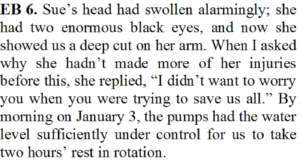

(i) At which of the following part of the body Sue did not have injury?
(a) above eyes
(b) head
(c) arm
(d) leg
(ii) What can one make out about Sue through her statement?
1. she was a brave girls
2. she was a concerned person
3. she was naughty
4. she could understand priorities
5. she was impatient
6. she was vociferous
(a) 1,2 and 3
(b) 2,3 and 6
(c) 1,2 and 4
(d) 4,5 and 6
(iii) How much rest each of the crew member could take after Jan 3rd
(a) one hour
(b) two hours
(c) three hours
(d) four hours
(iv) Which of the following word as used in the extract does not mean ‘big’ or ‘extra’?
(a) enormous
(b) deep
(c) more
(d) sufficiently
(v) In the above extract to whom does the word ‘you’ refer to?
(a) Sue
(b) mother of Sue
(c) crewmen
(d) none of the above
(vi) Why did they want to take rest in rotation?
(a) shortage of space
(b) pumps were required to be run
(c) the ship was safe
(d) the thieves were still very close
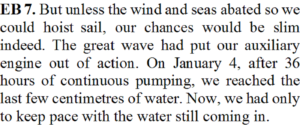

(i) What does the word ‘seas’ mean in above extract?
(a) depth of sea
(b) width of sea
(c) waves
(d) colour of sea
(ii) Which word in the extract is synonym of ‘bleak’?
(a) continuous
(b) pace
(c) action
(d) slim
(iii) For how many hours of continuous pumping, water in the ship was brought under control
(a) 4 Jan
(b) 40 hours
(c) 36 hours
(d) 26 hours
(iv) Which word in the extract mean ‘even now’?
(a) abated
(b) still
(c) unless
(d) only
(v) The ‘last few centimeters’ represents
(a) depth of water
(b) length of water
(C) width of water
(d) volume of water
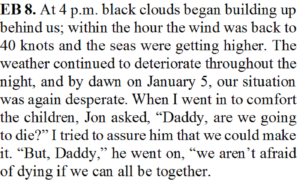

(i) Who is Jon?
(a) son of the author
(b) brother of Sue
(c) both (a) and (b)
(d) none of the above
(ii) What is meaning of ‘seas were getting higher’?
(a) waves were moving on higher side of ship
(b) waves were becoming larger
(c) waves were becoming smaller
(d) waves had remained higher
(iii) During the night weather had
(a) further improved
(b) further worsened
(c) remained similar
(d) none of the above
(iv) Why Jon was not afraid of dying?
(a) he was a simple person
(b) the whole family was together
(c) his father was a good sailor
(d) he has confidence on his father
(v) Which of the following phrase as used in the extract does not mean ‘to continue’
(a) went on
(b) began building up
(c) throughout
(d) none of the above
(vi) Which of the phrase as used in the extract does not mean worsening of situation?
(a) clouds began building up
(b) wind was back to 40 knots
(c) seas were getting higher
(d) tried to assure him
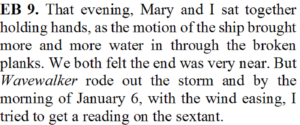

(i) Who is Marry?
(a) wife of author
(b) mother of Sue
(c) mother of Jon
(d) all the above
(ii) Why ‘Marry and I’ were holding hands of each other
(a) they wanted to heal the hands of each other
(b) they wanted to remain on the ship
(c) they wanted to comfort each other
(d) they wanted to jump into the sea together
(iii) What is the meaning of phrase ‘rode out’ in above extract?
(a) went out
(b) came out
(c) jumped out
(d) dug out
(iv) What did the couple thought about their situation?
(a) it will improve
(b) it will remain the same
(c) their end was near
(d) they could not decide anything
(v) Sextant is used for measuring
(a) weight
(b) angle
(c) speed
(d) opacity
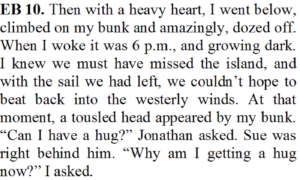

(i) What is the meaning of phrase ‘dosed off’
(a) slept
(b) ran
(c) relaxed
(d) woke up
(ii) Which of the phrase means ‘being sad’
(a) amazingly
(b) heavy heart
(c) beat back
(d) appeared by
(iii) Why did children to want to hug their father?
(a) they were about to die
(b) they were about sink
(c) they were feeling great pain
(d) the ship was very close to island
(iv) Did the author know that the island had been sighted?
(a) yes
(b) no
(c) both (a) and (b)
(d) none of the above
(v) Which of the following can be inferred from above extract
- author had a sound sleep
- when author woke up, it was already dark
- wife of author was angry at him
- children wanted to congratulate their father
- it was possible to sail back the ship
(a) 1, 3 and 5
(b) 2,4 and 5
(c) 3,4 and 5
(d) 1,2 and 4
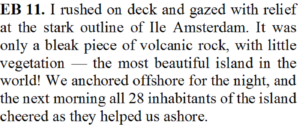

(i) Which of the word has been used in the extract to mean ‘went quickly’?
(a) rushed
(b) gazed
(c) anchored
(d) cheered
(ii) How many people have been living on the island?
(a) 15
(b) 28
(c) 36
(d) none of the above
(iii) Why residents of the island cheered author has his team?
(a) they were happy to help the team
(b) they wanted to arrest the team
(c) they wanted to rob the team
(d) they wanted to capture the ship
(iv) Why Ile Amsterdam has been described as ‘the most beautiful island in the world’ in the world.
(a) it was really very beautiful
(b) it is a wrong statement
(c) sight of the island represented success of the crew
(d) the crew was a fool
(v) Which antonym of the word ‘offshore’ has been used in the extract?
(a) ashore
(b) relief
(c) island
(d) inhabitants
Short Answer Questions (30-40 words)


Answer: Sue did not want to bother her father with her injuries. She made a card to change the pensive mood. Jonathan told his dad that they were not afraid to die because they all were together.
Kids thus motivated their parents.


Answer: Mayday call means the distress call issued by a ship in the situation of an emergency.
Probably there was no other ship in the vicinity of Wavewalker. Or signals were not propagating due to bad weather.
Hence there was no response to the distress calls.


Answer: Their ship had been damaged in a storm. They had managed to keep it afloat with lot of difficulty.
Sight of the island ensured their survival. Hence the island was called the most beautiful island in the world.


Answer: The ship was tilted almost in a horizontal position but the next wave lifted it to its upright position. Its deck was smashed. Starboard side had bulged inwards and many gaping holes had developed. Some of the pumps were also damaged.


Answer: Her head had swollen alarmingly. She had a deep cut on her arm.
She did not show her injuries at the first instance. She did not want to bother her parents while they were trying to save everybody.


Answer: Wavewalker was name of the ship used by narrator for the voyage.
It was 23 m long and its weight was 30 ton. Its body was made of wood. It was constructed by professional ship builders.


Answer: The storm jib was removed. A heavy mooring rope was tied around the stern. Everything in the ship was double-lashed, everybody practised the life-raft drill, attached lifelines, wore oilskins and life jackets.


Answer: On front of the card she had made caricature of her parents. She wrote that these are some funny people. Did they make you laugh? Inside the card she wrote that she loved both of them. This card was to say thanks to her parents and to hope for the best.


Answer: The narrator knew that the southern Indian Ocean beyond Cape Town often witnesses rough weather. So he hired two experienced crewmen to tackle one of the roughest seas the world.


Answer: In the afternoon of 4th Jan a second storm struck the ship. By the morning of 5th Jan their condition had again become desperate. That evening narrator felt that their end was very near.


Answer: Jonathan told that he wanted to give a hug to his father because he was the best father in the world. But the narrator denied the description.
Sue then told him that he was the best because he had found the island.


Answer: The narrator was wearing a lifeline that was attached to the ship. When the second wave straightened the ship, his lifeline received a big jerk. He was pulled in the air and landed on the ship.


Answer: By the morning of 5th Jan the situation had again become desperate for them. The narrator tried to assure kids that they would survive. Jon replied that they were not afraid of dying if they all can be together.


Answer: The narrator consulted charts. He made an allowance for the magnetic variation in the spare compass. He made an estimate for the influence of the westerly current. Then he asked Larry to steer the ship at 185 degrees.


Answer: The area of the ocean was about 150,000 square KM and the island was about 65 KM wide. Thus area of the island was very less in comparison to the area of the ocean. Hence it was called a pinprick in the vast ocean.
Long Answer questions (120-150 words)


Answer: During storm the ship was severely damaged. Water was gushing in.
Adults were trying to control the damage. They tried to start all the available pumps. Two of the hand pumps were chocked and one electrical pump was short circuited. A spare pump available in chart room was started. The narrator somehow closed the gaping holes on the deck and on the starboard side of the ship. They were trying to steer the ship towards nearby island.
Thus adults were worried, busy and stressed.
The children could feel the condition of adults. They tried not to worry them. Sue did not share her complete injury. She had made a card to motivate her parents. Jon had expressed his belongingness to the family.
Thus kids were trying to help their parents through small yet important acts of support and motivation.


Answer: During storm severe damage to ship was caused. The priority for the adults was to save the ship from sinking. Children could feel the stress their parents were facing. They ably supported the cause through various acts.
Sue was injured quite a lot. But she did not tell her complete injury to parents because she did not want to bother them. She had made a card for her parents. Through this card she expressed her affection and gratitude to them. This was a big motivation for the narrator.
Jonathan had realised that the situation was very tough. He expressed that he was not afraid of death. It was more important for him that the whole family was together. These were words of great maturity and wisdom.
Finally kids congratulated their father for having found the island.
Hence kids exhibited maturity and responsibility that was much above their age.


Answer: The wave was almost double the height of normal waves. Narrator’s head was smashed into the wheel and he was thrown into the sea. The ship was tilted almost in a horizontal position but the next wave lifted it to its upright position. The lifeline of narrator received a pull and he was airborne to land on the ship. His ribs cracked. His mouth was full of blood and broken teeth.
Deck of the ship was smashed by the wave. Starboard side had bulged inwards and many gaping holes had developed. Water was gushing into the ship.
The narrator tried to start all the pumps to throw water out of the ship. Some of the pumps were damaged. He started the spare pump available below the chartroom. He covered the gap in the starboard side by a canvas and water proof hatch.
Through above methods they were able to control the water level in the ship.


Answer: Success is result of right steps taken one after the other. One needs to have patience yet continue to do the best. This is called perseverance or being positive.
Every great personality who had made an impression on the development of humankind had converted his failure into grand success through perseverance. Thomas Alva Edison is one such great personality. He had said that his earlier attempts to make a bulb were not the instances of failure. But he had proved that through those methods bulb cannot be made. Finally he made the bulb.
Amount of practice a sportsperson does is phenomenal. Marry Com is a glaring example of perseverance.
Good marks scored by a student is the result of yearlong efforts. One would need to repeat this effort throughout the life to be successful.
Hence success in any field is the fruit borne on the tree of perseverance.


Answer:
Adventure Makes Life Worth Living
Everyday life evolves into something new. Those who believe in permanency, security and comfort of this day are leading life of a coward. The pleasure of knowing the unknown is immense. It gives so much joy and learning. Life begins at the edge of our comfort zones.
The word adventure has positive connotations An adventure involves challenging ourselves or trying out something new in life. It is not desirable to engage in dangerous and unsafe activities. We need to dare to seek priorities we set for ourselves. This is the adventure. It expands and broadens our mind and makes us learn new and unique things.
Adventure requires strict discipline, courage and enthusiasm. Adventure provides us with vast knowledge and experience. It takes us from the hectic life to a refreshed one. Life is incomplete without adventure. So try it and enjoy it.
****


0 Comments